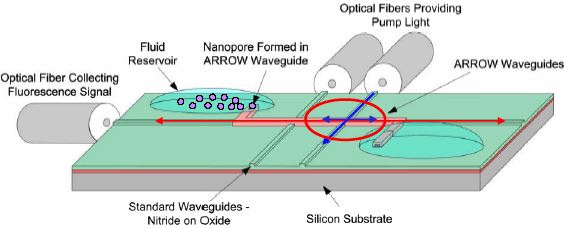Go to
May 10, 2006
Silicon photonics meets biology: Monolithically integrated single molecule sensors
Holger Schmidt, Department of Electrical Engineering, University of California, Santa Cruz, CA
Abstract: Single molecule spectroscopy in solution has grown into a research field with a wide range of applications in the life sciences, in particular molecular biology and medicine. Fully integrated optofluidic analysis instruments with single molecule sensitivity could have large impact for both fundamental science and biomedical applications. In the past, such devices could not be realized, largely due to the inability to guide light through micron-scale fluidic channels.

In this talk, I will review our recent work on development of a monolithically optofluidic detection platform based on liquid-core ARROW waveguides. I will discuss the principles of planar, two-dimensional waveguide arrays that are compatible with single molecule detection. Fabrication methods and optical performance, including the first demonstration of single molecule sensitivity on a silicon chip are presented. I will also describe applications of this technology to problems in molecular biology and diagnostics.
About the speaker: Holger Schmidt received the Diploma degree in physics from the University of Stuttgart in 1994, and the M.S. and Ph.D. degrees in electrical and computer engineering from the University of California, Santa Barbara, in 1995 and 1999, respectively. He was a Postdoctoral Fellow at the Massachusetts Institute of Technology, Cambridge. He has been Assistant Professor of Electrical Engineering at University of California, Santa Cruz since 2001, and associate professor since 2005. He has authored or coauthored over 60 publications.
Dr. Schmidt's research interests include integrated biophotonics, nano-magneto-optics and integrated quantum optics. He received an NSF CAREER Award in 2002.
Download visuals (2.2 MB pdf)
Secondary navigation
- January 29, 2018
- August 30, 2017
- Past seminars
- 2016 - 2017 Seminars
- 2015 - 2016 Seminars
- 2014 - 2015 Seminars
- 2013 - 2014 Seminars
- 2012 - 2013 Seminars
- 2011 - 2012 Seminars
- 2010 - 2011 Seminars
- 2009 - 2010 Seminars
- 2008 - 2009 Seminars
- 2007 - 2008 Seminars
- 2006 - 2007 Seminars
- August 31, 2007
- June 29, 2007
- June 20, 2007
- June 5, 2007
- May 30, 2007
- May 16, 2007
- May 15, 2007
- April 24, 2007
- March 27, 2007
- March 14, 2007
- February 9, 2007
- February 8, 2007
- January 12, 2007
- December 5, 2006
- November 14, 2006
- October 31, 2006
- October 27, 2006
- October 26, 2006
- October 20, 2006
- September 20, 2006
- September 20, 2006
- September 20, 2006
- September 19, 2006
- 2005 - 2006 Seminars
- August 23, 2006
- August 22, 2006
- June 26, 2006
- June 20, 2006
- June 16, 2006
- June 7, 2006
- June 6, 2006
- May 30, 2006
- May 17, 2006
- May 10, 2006
- April 27, 2006
- April 12, 2006
- March 31, 2006
- March 29, 2006
- March 22, 2006
- March 15, 2006
- February 27, 2006
- February 8, 2006
- January 25, 2006
- January 19, 2006
- January 18, 2006
- January 17, 2006
- January 11, 2006
- November 30, 2005
- November 23, 2005
- November 2, 2005
- October 26, 2005
- October 25, 2005
- October 5, 2005
- September 28, 2005
- 2005 Seminars

